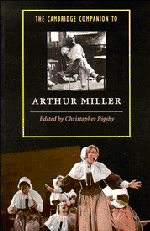Book contents
- Frontmatter
- 1 Introduction
- 2 The tradition of social drama
- 3 The early plays
- 4 All My Sons
- 5 Death of a Salesman and the poetics of Arthur Miller
- 6 Conscience and community in An Enemy of the People and The Crucible
- 7 A View from the Bridge
- 8 The Holocaust, the Depression, and McCarthyism
- 9 Miller's 1970s "power" plays
- 10 Miller in the eighties
- 11 Miller in the nineties
- 12 Arthur Miller and the cinema
- 13 Arthur Miller's Fiction
- 14 Critic, criticism, critics
- 15 Arthur Miller
- Index
8 - The Holocaust, the Depression, and McCarthyism
Miller in the sixties
Published online by Cambridge University Press: 28 May 2006
- Frontmatter
- 1 Introduction
- 2 The tradition of social drama
- 3 The early plays
- 4 All My Sons
- 5 Death of a Salesman and the poetics of Arthur Miller
- 6 Conscience and community in An Enemy of the People and The Crucible
- 7 A View from the Bridge
- 8 The Holocaust, the Depression, and McCarthyism
- 9 Miller's 1970s "power" plays
- 10 Miller in the eighties
- 11 Miller in the nineties
- 12 Arthur Miller and the cinema
- 13 Arthur Miller's Fiction
- 14 Critic, criticism, critics
- 15 Arthur Miller
- Index
Summary
In some ways Miller seemed out of synch with the sixties. Rather than writing about Vietnam or civil rights, he chose to look back to the Depression in The Price, the Holocaust in After the Fall and Incident at Vichy, McCarthyism and the Depression in After the Fall. Yet all three plays also explore the problem of denial, and to Miller this was the central issue of the moment. Denial, after all, lay behind the American attitude toward race, and it facilitated the waging of an immoral war in south-east Asia. There is certainly no evidence that he abstracted himself from the political realities of the decade. Quite the contrary. He became actively involved in the anti-war movement. Yale, the University of Michigan, and even West Point invited him to speak about the war. He had not, however, forgotten about McCarthyism, warning students, at a University of Michigan teach-in, that the FBI, who, he claimed, was sitting among them, would hold them accountable for their actions and even ask them to condemn their present passions in the future. He nevertheless applauded the student protest, calling it “the essential risk of living.”
- Type
- Chapter
- Information
- The Cambridge Companion to Arthur Miller , pp. 115 - 138Publisher: Cambridge University PressPrint publication year: 1997



